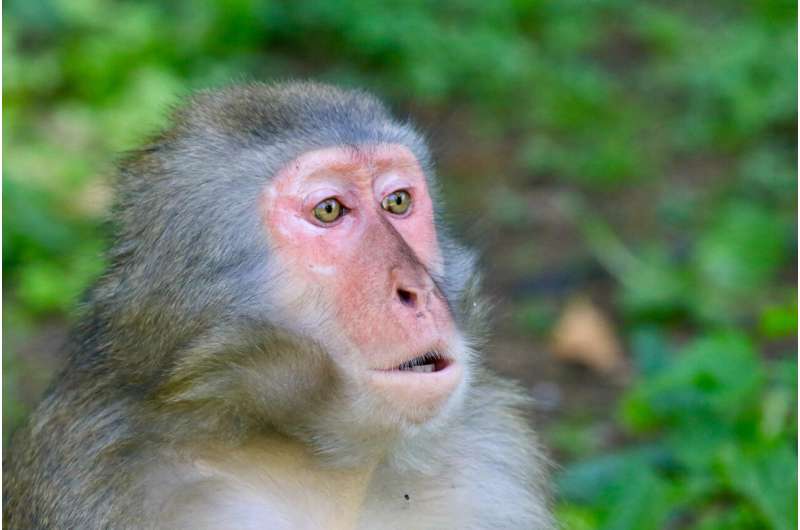An 'emotional' Japanese macaque. Credit: Leiden University
We should assume that animals can have feelings too. From an ethical point of view this should inform our dealings with animals, researchers from Leiden University and Utrecht University argue in an opinion article that was published in the scientific journal Affective Science on Thursday 10 March.
Some of the leading behavioral scientists in the world have hypothesized that many animal species can have emotions. But whether animals also have feelings is the subject of much debate, and some behavioral scientists believe they do not. This is incorrect, say cognitive psychologist Mariska Kret (Leiden University) and behavioral biologists Jorg Massen (Utrecht University) and Frans de Waal (Emory University and endowed professor in Utrecht). Based on observations, there is a good chance that animals can also have feelings; it is just very difficult to investigate this.
Feelings are our own interpretation of emotions
First of all the difference between emotions and feelings. Massen: "An emotion consists of three components: a physiological one that determines how your body reacts to a stimulus, a behavioral one that makes you express emotions and a cognitive one that makes you make a certain choice. For many animal species, it has been shown that they have emotions."
Feelings go a step further. "Feelings can be thought of as the subjective interpretation of your own emotions," Kret explains. "Negative emotions can make you feel unhappy, for example. Being able to have feelings also enables you to empathize with the emotions of another person and to think about how you can help them. And for that, an important cognitive principle must be present: being able to take the perspective of that other person."
In both humans and other animals, much research has been done on emotions and feelings. Massen: "Emotions can be investigated experimentally in animals, and very well. These could be primates, but also birds and even bees." And new methods are constantly being used for this, Kret explains. For example, a thermal camera can measure the physiological response of a human or animal to a frightening image. Then the blood is drawn away from the skin and sent to the muscles instead: the body prepares to flee. Kret: "With cognition tasks, you can measure whether an individual interprets a situation as "glass half full or half empty." And what you can notice very directly: an animal that sits apathetically in a corner is not feeling well." The same emotions play a role in different animal species. Kret: "No single method can measure emotion directly, but by combining different methods we make the picture as complete as possible."
The same basic conditions
It is a lot more difficult to determine objectively which feelings an animal has because the interpretation of the test subject plays a role. Massen: "With people, this type of research involves asking questions. You can ask animals a question, but they can't give an answer. Incidentally, research into feelings is difficult even with humans: on the one hand we have difficulty recognizing our own feelings and on the other we are inclined to give socially desirable answers. So the question is whether asking questions is the right way to research feelings."
There is a lot of evidence, though, that animals can also interpret emotions, Kret says. "They can copy and interpret the emotions of others, they can empathize with the desires of others and it has recently been shown that chimpanzees, for example, also understand what others believe." Given that chimpanzees are so closely related to us and meet all these basic conditions, the authors believe it to be plausible that they also have feelings. Massen, Kret and De Waal therefore conclude that from an ethical standpoint it is better to let the burden of proof go both ways in this discussion. Massen: "Let's assume that animals also have feelings unless proven otherwise. And in the meantime, we should continue to study whether and how animals subjectively interpret emotions. If we better understand animals' emotions and possible feelings, then we will be better able to respond to their needs."
More information: Mariska E. Kret et al, My Fear Is Not, and Never Will Be, Your Fear: On Emotions and Feelings in Animals, Affective Science (2022). DOI: 10.1007/s42761-021-00099-x
Provided by Leiden University























